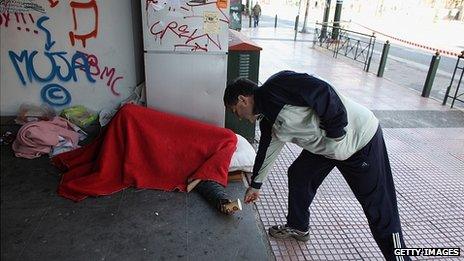The Greek gamble: New bailout means new EU risks
- Published
- comments

Visitors to Athens see signs of increased poverty
It would be worth asking Jean-Claude Juncker, the head of the eurozone finance ministers, when he last walked the streets of Athens.
The same question should also be put to the EU's Economics Commissioner Olli Rehn. It could also be usefully asked of the eurozone finance ministers gathering in Brussels.
They are there to decide whether Greece should get a second bailout package and so avoid bankruptcy. They are also there to decide the fate of a country. Their knowledge of the real Greece matters because they are about to take an unprecedented gamble.
In the last quarter of 2011, the Greek economy shrank by 7%. The country is in the fifth year of economic decline. Unemployment is at 21% and rising fast. An estimated 150,000 businesses have closed. Emigration is at its highest level in 50 years.
A walk through the centre of Athens would reveal that thousands are sleeping rough on the streets each night. Thousands, too, line up for lunch at feeding centres. Many of them once held good jobs.
This is the view of Ilia Latrou, a resident: "The conditions are appalling, because we have living costs equivalent to Paris and London and we're beginning to have wages equivalent to Bulgaria's, so the people cannot cope, they simply cannot cope. When you have a quarter of the population unemployed... people are starving. We have food lines in Athens. We haven't seen things like that since the forties, since the time of the [German] occupation."
Does austerity mean ruin?
Here is the gamble: ignoring the reality of a country in decline, more austerity is demanded by EU officials and finance ministers. Greece has to fire 150,000 public sector workers by 2015. The minimum wage will be cut by 22%. Pensions of more than 1,300 euros (£1,079; $1,709) a month will be cut by 12%.
It is hard to recall when such spending cuts were demanded of a country in economic freefall. The challenge for the EU is immense. It will define their reputation for years to come. Will they end up rescuing a country or breaking it?
When questioned over the strategy Greek ministers reply by asking, "What is the alternative?" Greek ministers and European officials vividly describe the catastrophe if Greece defaults. "If there is a default," said the German centre-right MEP Elmar Brok, "then there would be no pensions, no salaries at all.
"That would be a total downfall of the whole economy and the state. It would become a failed state."
No one pretends that default would be an easy option. There would be a run on the banks and, at the most elemental level, there would be the question of how soon a new drachma could be printed and distributed.
But those who oppose the new bailout package argue that Greece is not being saved from the fate of a failed state, but being pushed into one - and for years to come.
Rotten practices
Certainly Greece and its politicians carry a heavy responsibility for the dilemma they find themselves in.
Its political system was based on cronyism, where public sector jobs were doled out to reward supporters. Promised reforms never happened. It is estimated there are 60bn euros in uncollected taxes. Privatisation has stalled.
Many of the undertakings given at the time of the first bailout were not honoured. State agencies were not pruned. Costs in the health service - particularly the buying of drugs - were not cut back.
So after months of wrangling, the eurozone finance ministers must decide. There are still issues to be settled. Who precisely will oversee the implementation of this package?
Certainly last week some German politicians were losing faith in the ability of Greece to live up to its promises. The German finance minister feared they were pouring money into a bottomless pit.
Some of the ideas to ensure Greece stuck to the deal only reinforced the country's humiliation. The idea - probably now dropped - of imposing a budget commissioner from outside stung ordinary Greeks. Athens still might have to set up a separately managed account to service its debt. It would be an escrow account, giving legal priority to debt and interest payments over other expenditure.
Two of the party leaders have had to give written guarantees that they will implement the spending cuts after elections, so binding the hands of the politicians, whatever the will of the people as expressed at election time.
Some in the eurozone would even prefer Greece to postpone its elections.
The big question is whether even if Greece carries out all these measures, it can succeed in meeting the target of reducing its debt to 120% of GDP by 2020. It could well be that further funds will have to be raised - perhaps from eurozone governments. And the amount the IMF will put in is not settled.
Only when the broad package has been agreed will the private investors begin the process of taking 70% cuts on their investments, so reducing the Greek debt mountain by 100bn euros.
In all of this, there are voices who say that a new emphasis has to be placed on growth, that there is a need to free up money from the EU's regional fund and invest it in Greece. It will be interesting to see whether such ideas gather pace.
But the suspicion remains that this is a deal less about Greece and more about defending the political project of the single currency and buying time for the eurozone: to ensure that if down the road Greece defaults, the impact will be less on the banks and on other weak eurozone countries.
If there is an agreement today or early Tuesday, the markets will celebrate and EU officials will breathe a huge sigh of relief, but they will have gambled on Greece's future.